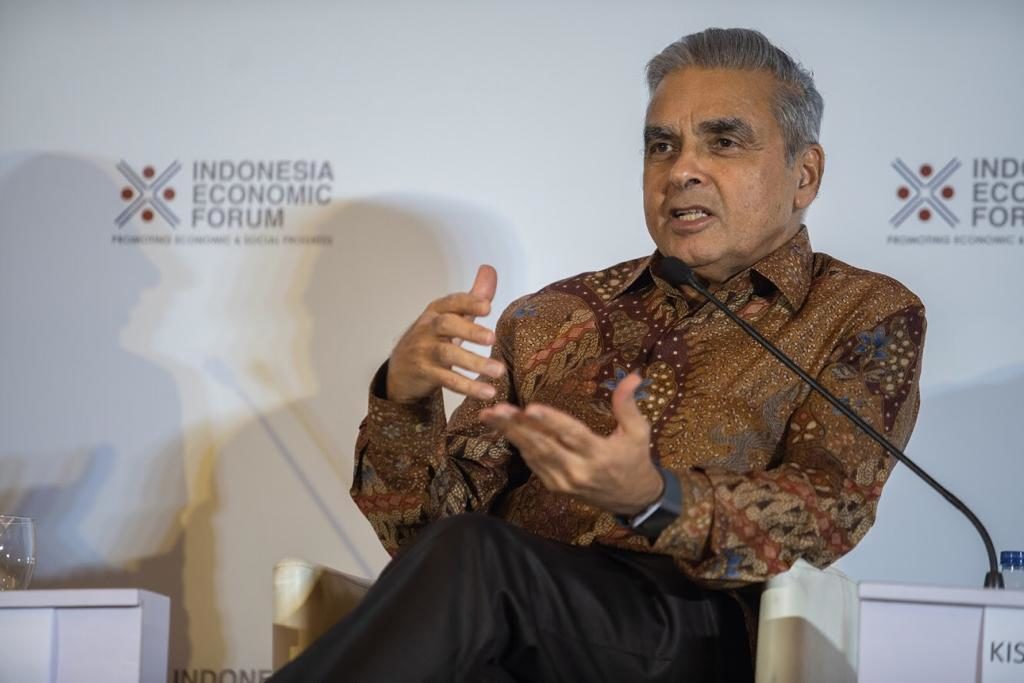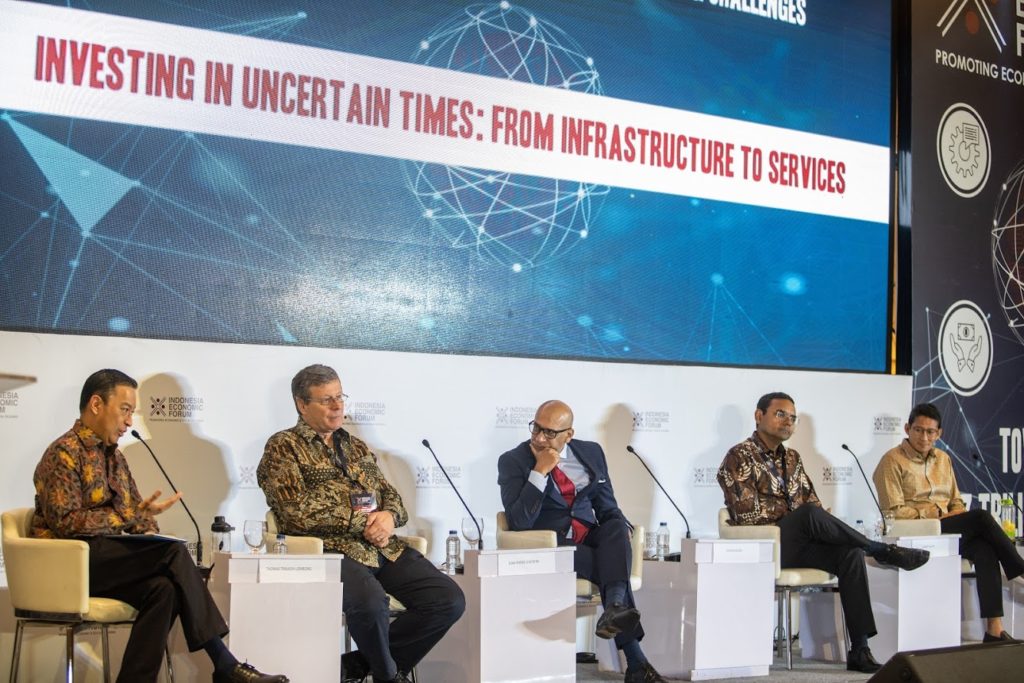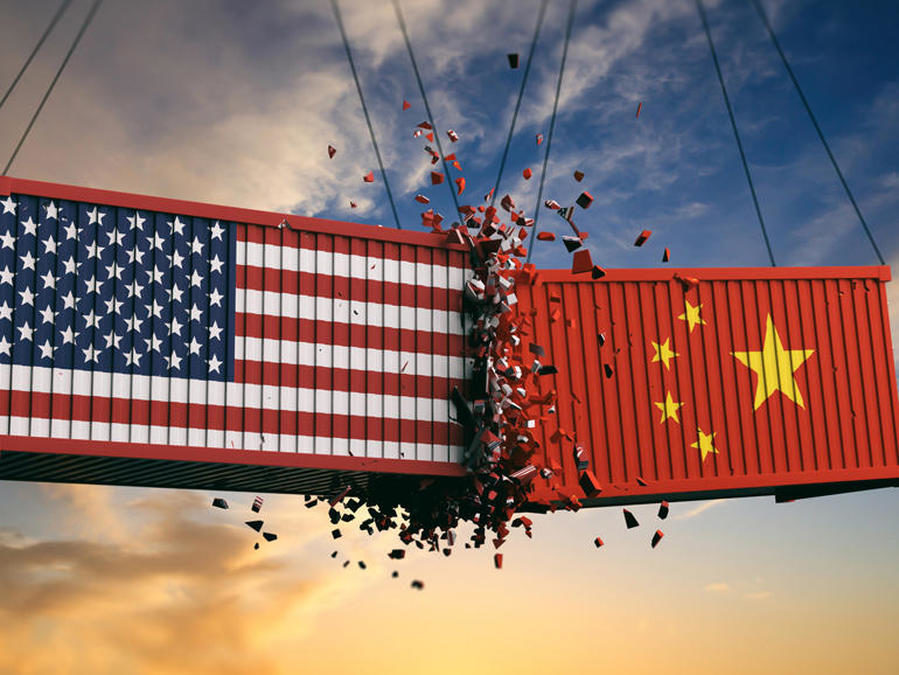Editor: Shoeb Z Kagda
The global economy is entering a period of great geo-political, technological and economic disruption; there is great churn in the world. The political discord in the US is reverberating around the world; while China is undergoing a fundamental economic restructuring, noted Indonesia Economic Forum Founder Shoeb Kagda at the 6thAnnual Indonesia Economic Forum.
Picking up on this theme, Kishore Mahbubani, a renowned academic and a distinguished thinker, the competition between the US and China, the two preeminent economic powers today will have far reaching implications for Southeast Asia and Indonesia in particular.

According to Mr. Mahbubani, when the world’s leading emerging power, China, is about to take over the world’s existing leading power, US, the results are almost always certain rising levels of geo-political tensions. Where the uncertainty lies, is in the impact of such geo-political contests on the global economy and as to who will emerge as the winner. Despite such uncertainties, the rest of the world is proving to be quite resilient in the face of this major geo-political contest. While the United States of America is moving away from multilateral free trade agreements, i.e Trans- Pacific Partnership and the Climate Agreement, the rest of the world is moving on. Africa launching its free trade area and Indonesia joining RCEP are only few of the many examples of resilience. He also mentioned the array of opportunities that can be taken advantage of by emerging economies. For example, due to the trade war American manufacturers are moving out of China and courting other South East Asian countries for potential alternative investment opportunities. Vietnam, for example, has already taken advantage of the spill-over from China and is enjoying an economic boom.
He also emphasised on the ‘uncertainty’ in terms of this conflict as it was “difficult to figure out who’s going to win this game because they are not playing the same game”. According to him, the US is strategizing for the short game – focusing on what will get President Donald Trump re-elected for a second term in the 2020 presidential elections. Meanwhile, China is playing the long game, strategizing on what would benefit the economy over the next 15-20 years. The re-election of President Donald Trump in 2020, might seem like a threat to China’s rising dominance but as it stands, it might just be the opposite. He emphasized that China could be a significant beneficiary to his re-election as President’s Trump’s actions have already damaged many of America’s alliance relationships and lowered the standing of America in the world, creating a long geo-political space for China to exploit. In fact, one of the many examples Mr. Mahbubani cited was that of ‘Huawei’. On the technological front, he noted this clearly illustrates how America jumped into the geo-political contest without a long-term strategy. With America cutting off supplies to Huawei, China will only increase its investment in technology to make sure it is not vulnerable again to American domestic political agenda. A strategy meant to harm China will only result in strengthening it.
On the political front, Mr. Mahbubani stated that the US no longer stands to be a democracy and instead has transitioned into being a ‘plutocracy’, wherein most of the major decisions are made by the rich and elite. The outcome of such a shift has been that the US is now the only developed society where the average income of bottom 50% of the population has gone down over the last 30 years. In contrast, the average income of bottom 50% in China has gone up dramatically and the last 30 years have been the best in the previous 3000 years of Chinese history. The reason being that the Chinese Communist party has become the world’s leading ‘meritocracy’. This illustrates how both the US and China have undergone a change in the political system and that both face challenges in the coming few years with the US turning things around in the political system and China choosing a successor that will not doom China’s rising dominance.
In the face of this conflict, Mr. Mahbubani also highlighted the tremendous opportunities this holds for Indonesia, as China and US will significantly court Indonesia in terms of investment opportunities. He applauded Indonesia’s decision to join RCEP and stated that it is a fundamental choice that all economies have to face in order to succeed, whilst citing India’s poor decision to not being a part of RCEP. To win in this geo-political ‘game’, Indonesia must play in such a way as to get the best from both China and the US while keeping them both happy. He was optimistic about Indonesia taking advantage of this ‘one in a lifetime opportunity’ by being more economically competitive and undertaking trade and labour reforms to improve the business climate. Certain other advantageous factors, that he reflected upon was, how Indonesia has a strong domestic market and is well connected and well placed.

Sumit Dutta, president director of PT HSBC Indonesia, also emphasized on how Indonesia is a high potential economy because of its solid macro-economic fundamentals. He highlighted on how Indonesia needs to transition into a high-performance economy to fully achieve a $7 Trillion dollar economy. He shared a similar tone with Mr Mahbubani and stated that, since Indonesia has a strong domestic market, companies can thrive by selling domestically but this goes beyond domestic markets. In his view, Indonesia has a bigger leadership role to play in the global economy and as capital is currently being courted by Thailand, Vietnam and Philippines, Indonesia too has to become a part of such equation to fully integrate itself into the global economy.
Thomas Lembong, former chairman of the Indonesia Investment Coordinating Board noted that on the financial front, the role of the US dollar in the long term needs to be re-evaluated. He believed that the focus on the dollar is suffocating the economy and that we need a compliment to the US dollar, i.e other currencies such as the Yen, Euro or the Renminbi. He stated that financial liquidity is like oxygen in the room and with US leaving the global stage, financial markets are suffocating. Despite this, he believed that the worst is over for the global economy and that we should be anticipating a rebound led by the US.
Jean-Pierre Diserens, CEO of Fidurhone SA and Secretary General of CIFA, shed some light on the global financial system, which has been heavily dependent on the US dollar and how it needs to be reformed given that the financial system faces a huge $700 trillion bubble. He also gave his outlook from the perspective of an Investor, stating that over –regulation is one of the biggest hurdles that Indonesia faces. He believed that the real potential of Indonesia lies in its domestic markets and as the population becomes demanding in terms of increasing its quality of life and average income, it has the potential of being a leading market. He re-iterated that Indonesians should trust their own market and invest within Indonesia to support unicorns and start-ups, wherein the youth will be free to create new jobs and develop.
Sandiaga Uno, Former Vice-Governor of DKI Jakarta, shared a positive yet realistic outlook as he highlighted that the biggest concerns for Indonesians are unemployment and high cost of living. Although he noted that investment begets employment and that the growth rate of 5% is stable, he also shared concerns on whether the trickle-down effects reached constituents in addition to the lack of investment in energy and food. He agreed with Mr. Jean Pierre that Investments from private sectors is what is going to help Indonesia overcome these challenges and therefore highlighting the need for Indonesia to open up the markets and transition into a high performance economy.

